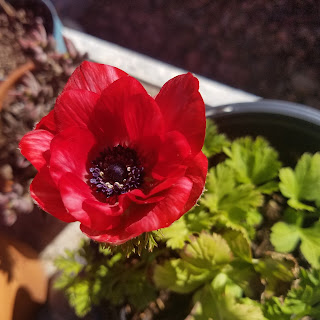January 09, 2019\\
California, USA\\
Here's the latest from the Garden\
As a garden beginner, this was tough. I bought this plant and it was beautiful but then, it withered away and for months it was just a pot of dirt. via Instagram
This the first time I've dealt with an annual, a plant that disappears and returns every year. I spend a lot of time worrying about underwatering, then, overwatering and then trying to compensate for the ridiculous SoCal summer heat. It hasn't been all success, I tell you.
However, here this one is. So, celebrate!
You can get a look at the full sized photo of this and more from the Patron Exclusive Photo Gallery on the Blog\ https://www.patreon.com/posts/patron-exclusive-23881979
Catch more from the Garden, here\ www.ClubBouquet.artscience84.com
Here's a few more of the Harmony Anemone on Instagram.
Check out the #clubbouquet hashtag for original garden and flower photography
Cheers,
Josh\ #84Culture
www.artscience84.com



